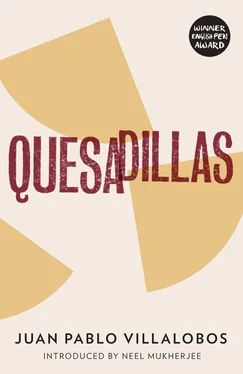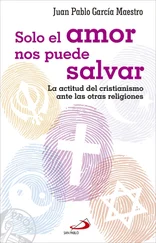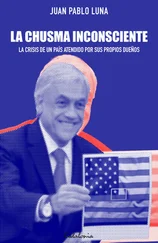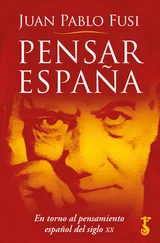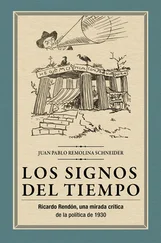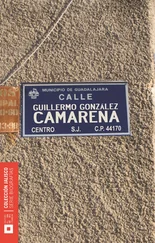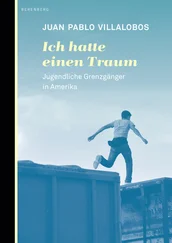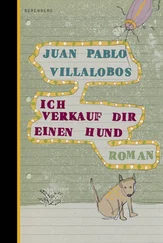Callimachus was the most curious to discover what the world was like beyond La Chona. Archilochus was too busy channelling his frustration at no longer being the second eldest, and Electra was too small to be interested in anything other than working out why her dolly and her little classmates’ dollies were so different.
‘Tell me!’ Callimachus begged me.
‘Pegueros is imposing,’ I told him. ‘There are some really tall buildings, a hundred storeys high, and all the houses have swimming pools. The problem is the crocodiles.’
‘Crocodiles?’
‘Yeah, there are crocodiles everywhere.’
In exchange I made him my slave. He fetched me things that were far away; I demanded he address me formally — sir, yes, sir — and he did the chores I was meant to do around the house, which weren’t many, or particularly difficult, due to my mother’s compulsive cleaning, but I had to keep my slave busy all the time, so he didn’t have a moment to think and rebel. Archilochus bided his time, exuding an exaggerated indifference stripped of any idleness; it was a most interested indifference. When it was time for the quesadillas, he would try to expose me as soon as he got the chance, in the relative tranquillity we’d achieved with the deduction of thirty fingers from the teatime machinations.
‘Dad, did you know that in Pegueros there are crocodiles in all the swimming pools?’
‘There aren’t any crocodiles in Pegueros,’ I said quickly, taking advantage of my father’s delayed reaction due to the astonishment the news was still causing him — it was almost as if he was a foreigner and didn’t yet understand what sort of country he lived in, although, in his defence, it had to be said that the politicians really were displaying extremely high levels of ingenuity when it came to screwing people over. And he still didn’t know how badly Salinas was going to take the piss!
‘The place where I said I saw crocodiles was Guadalajara Zoo.’
The commotion caused by my mention of the zoo gave me a chance to look my father straight in the eye, so the fucker would finally understand the nature of my rebellion. Even though I’d come home, for reasons of convenience, I wasn’t the same any more. I’d changed; my world view had broadened beyond the confines of our town and was now a state-wide vision. If he said that the whole world was the same, I would argue that acacia trees didn’t even exist.
The average number of quesadillas per person and their weight per unit had increased because of the reduction in the family, it’s true, but not in the way I had hoped. On the news they were forever talking about pacts: growth pacts, solidarity pacts. It was the current government’s method of choice for fulfilling its mission of screwing up our lives. My father remained loyal to his healthy habit of insulting all politicians, applying a level of hostility in direct proportion to the devaluation of the peso.
‘Oh well, that’s all right, then, you fucking sons of bitches — didn’t you study maths?! How can you be such fucking idiots?! Can’t you see people are dying of hunger?! What damned planet do you live on?’
They increased salaries by 18 per cent, with inflation at 200 per cent and devaluation at 3,000 per cent. The vines grew like crazy, but this time they didn’t even produce one lousy watermelon. Well, sometimes one watermelon would appear, just one, but you had to share it between millions and it was dry and tasteless.
‘I met a politician.’
One night it occurred to me to tell my father this, to see if I could save him from imminent suicide. It wasn’t because I felt sorry for him; quite the opposite. I wanted him to survive and carry on living in this country — that was his punishment.
He stood up without letting go of the quesadilla in his right hand, dragged me away from the table and shut us both up in his room.
‘Was he the one who did that to your face?’ He touched the scar on my cheek with the edge of the quesadilla.
‘No. Aristotle did that, I’ve already told you.’
‘Why are you lying? Tell me the truth. Was it the politician?’
‘No, it wasn’t.’
‘Where did you meet him?’
‘In Tonalá.’
‘Where? How?’
‘At a juice stand. He bought me breakfast.’
‘What did he ask you for in exchange?’
‘Nothing.’
‘Don’t lie! What did he do to you?’
‘He didn’t do anything to me.’
‘Do you think I’m an idiot? What did he ask for in exchange? What did he do to you?’
‘Nothing. He wanted me to work for him, but I ran away.’
‘You ran away? Did he have you locked up?’
‘No. We were having breakfast when I ran away. Although we didn’t have breakfast, since they never brought us our food.’
‘Stop talking crap! This is important! What did he do to you? Are you all right?’
‘Yeah, I’m fine. He didn’t do anything to me, seriously.’
‘What did he look like?’
‘He wore a tie.’
‘But what did he look like, physically?’
‘I don’t know. I never notice that kind of thing.’
From then on, my father started showing me photos from the newspaper. ‘Is this him? Is this him?’ he would ask me, but it was never the tie man. He was showing me yet another photo one afternoon when Officer Mophead came to visit us. Fuck me, I thought when I saw him in the doorway, the pretend twins have turned up. But the twins hadn’t turned up; he had come to arrest me. Jaroslaw had accused me of theft and breaking and entering. My parents could perhaps have detected a certain irony in the fact that in the end, instead of bringing their children back to them, the police were taking them away.
Luckily, the town’s criminality had not yet reached a sufficient level or prestige to merit a jail of its own, never mind stretching to a juvenile detention centre. Our lawbreakers were only acting out of hunger, in romantic desperation, because they were drunk or because in fact they were mad and there wasn’t a psychiatric hospital nearby either. There was a police station in the centre of town where there were five lock-ups referred to rather grandly as cells . When the staff found their paperwork was growing unmanageable, the cells’ residents would be transferred to the jail in Puente Grande. This hardly ever happened, because Puente Grande was clogged up with real criminals, and because ours inspired pity due to the sheer number of extenuating circumstances that came out when one started to investigate their misdeeds. Nothing but lousy shoddy crooks. These days there is a jail in Lagos which serves as the perfect pretext for the townspeople — especially the priests — to declare sententiously, over and over and over again, that the old values are dead.
They put me in a cell to provide company for a down-and-out drunkard who hadn’t been able to find anywhere better to sleep off his hangover and — what a surprise — a cousin of my father who had a reputation for being a stoner and whose nickname was Pink Floyd. It was the one courtesy Officer Mophead extended to my father, granting us a family cell.
‘I’m so glad you’re here,’ said my father to Pink Floyd, relieved at the coincidence of our legal entanglements.
‘Yeah, no, totally, pleasure’s all mine,’ replied my uncle.
‘You can look after him for me.’
My father might as well have said: he’s not an expert at living in the slammer. On the other hand, I was an expert at living in a shoebox.
‘I’ll be right here, don’t you worry.’
My father went to the neighbours’ house to try and convince Jaroslaw to withdraw his accusation. Officer Mophead had told him that this was the simplest solution; otherwise there was a risk that I’d be transferred to the juvenile detention centre in Guanajuato.
Читать дальше
